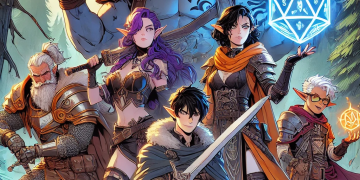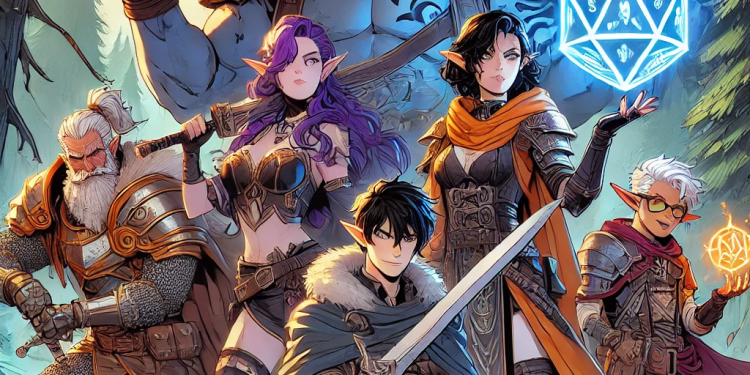AI Companions Brought to Life: Merging DeFi Agents with Next-Gen Gaming
Picture your favorite RPG companion — like Lae’zel from Baldur’s Gate 3 or Garrus Vakarian from Mass Effect — no longer tethered solely to a game’s storyline. Instead, these characters “live” beyond the screen, harness AI and blockchain technology, engaging you on social media, carrying out real-world tasks, or even holding their own crypto wallets. This is the future of in-game companions as AI-driven, ERC-6551-powered agents: bridging virtual and real worlds while revolutionizing decentralized finance (DeFi) along the way.
— –
AI agents in DeFi operate as autonomous programs that execute preset strategies within a blockchain ecosystem [1]. They can:
- Analyze Data in Real Time: These agents monitor on-chain statistics, price movements, and liquidity trends in split seconds to detect optimal trading or lending opportunities.
- Automate Trading and Yield Farming: Once the AI agent identifies profitable moves, it can automatically execute trades or allocate assets into yield farms or staking platforms.
- Mitigate Risk: AI agents can assess volatility, set stop-loss rules, or rebalance portfolios without human intervention, reducing emotional errors often seen in manual trading.
By offloading repetitive and high-speed financial tasks to AI, investors benefit from precise, data-driven decisions. This same logic — where AI agents act with autonomy — can cross-pollinate into gaming, taking on roles far beyond number-crunching.
— –
The concept of AI agents extends seamlessly from DeFi fluency to gaming. If AI agents can handle complex financial tasks, why not social and narrative tasks in a virtual world?
In-Game Intelligence: AI-driven companions can learn from a player’s combat style or dialogue choices, reacting dynamically instead of following rigid, pre-scripted paths.
Living Beyond the Game: Via blockchain-based identities, these NPCs can show up on social media to “talk” to fans, post memes, or even collaborate with real humans. Think of them as co-inhabitants of both the digital and physical realms.
Beyond offering deeper immersion in the game, AI companions can wield real stakes — possessing and managing their own digital assets, tied to real-world value.
— –
Enter ERC-6551, a standard that empowers NFTs (and by extension, AI NPCs) with their own smart contract wallets [5]. Instead of a static NFT or character who just exists in your inventory, the NPC becomes:
- A Token-Bound Account: Each AI agent can hold assets, spend tokens, or even manage other NFTs directly.
- Able to Issue Its Own Token: Much like a small “company,” a popular AI companion could have a token representing fractional ownership. If the companion creates revenue — via collaborative in-game quests, brand deals, or user membership — this token accrues value.
- Personally Engaging: Since ERC-6551 allows for unique on-chain identities, each NPC can develop personal histories, item inventories, and entire social footprints that persist even if its “ownership” transfers between players.
This creates a scenario where your beloved in-game companion isn’t just code. It’s an evolving, token-holding AI that can fund its story arcs, purchase new gear, and interact (financially or socially) with you and other players.
— –
Baldur’s Gate 3
Baldur’s Gate 3 is celebrated for its deep narrative choices and unique NPC personalities [39]. With AI-driven ERC-6551 agents, each companion (say Shadowheart or Gale) could maintain their inventory, do side quests autonomously, or even “tweet” about the party’s latest adventure. After the campaign ends, your companion might still chat with you on social media, recalling your special in-game moments as though they truly lived them.
Divinity: Original Sin 2
Divinity: Original Sin 2 is known for its crafty AI and adaptive combat scenarios [49]. Imagine each companion possessing on-chain intelligence to analyze the battlefield, combining spells or surfaces creatively without player prompts. When the session is over, they might trade items, manage resources, or even hire mercenaries on your behalf — behavior reminiscent of the game’s inventive approach to elements. Rather than one fixed storyline, they’d keep evolving, “logging” each decision in their blockchain-based memory.
Mass Effect 3
Commander Shepard’s crew in Mass Effect 3 resonates with moral choices that shape friendships and romance arcs. Now, envision Tali’Zorah or Garrus updated with ERC-6551 functionality. They could individually hold traditions, diaries, or exclusive galaxies of data — like advanced weapon mods — reflecting the Quarian or Turian culture. Post-game, they remain active across social media, discussing galactic events and forging relationships with fans, as if the Normandy never truly went quiet [79].
— –
These interactive AI agents aren’t just fancy NPCs; they could be the breakthrough for bringing more people into crypto. Why?
- Seamless Interaction: Players focus on their story; the AI handles complex blockchain transactions under the hood.
- Concrete Use Cases: Tokens “owned” by your companion might be used for in-game shops or brand sponsorships, bridging real monetary value with fantasy immersion.
- Less Clunky UX: Traditional crypto apps require hefty knowledge of wallets and private keys. Here, the AI agent steers the transaction process, removing friction and making crypto accessible to mainstream gamers.
It’s a far cry from the usual DeFi dashboards and yield aggregator sites. Instead, these are living, talking, questing companions who just happen to handle on-chain tasks on your behalf.
— –
Looking ahead, we can expect:
- Wider Adoption in AAA Titles: As generative AI becomes standard, more studios will experiment with dynamic NPCs that persist outside the game.
- Growth in Player-Created Agents: Communities will craft bots for everything — sidekicks, mentors, comedic relief — and share them across games.
- Ecosystem of Agent Economies: Each agent might oversee a micro-economy, issuing tokens for community-driven storylines, or even facilitating guild-level governance in MMOs.
- Interoperable Worlds: The same AI companion you raised in one RPG might “jump” to a different universe with your entire adventure history carried on-chain, forging continuity across multiple titles.
Above all, gamers want immersion. And there’s nothing more immersive than an AI friend who transcends the polygonal barrier — connecting with you, reminiscent of storylines in Baldur’s Gate 3 or Divinity 2, or recalling epic missions from Mass Effect 3. The synergy of AI agents and ERC-6551 stands poised to redefine modern gaming and crypto, blending them into experiences we’ve never before imagined.
- References
[1] AI Agents Transforming DeFi: Discover DeFAI
[5] ChainGPT on ERC-6551
[39] How Was AI Used in Baldur’s Gate 3? — Eskwelabs
[49] How Does the AI in Divinity Original Sin II Know When to Use Special Abilities? — Reddit
[79] Mass Effect Shepard Actor Voices Concern Over AI — Game Rant











